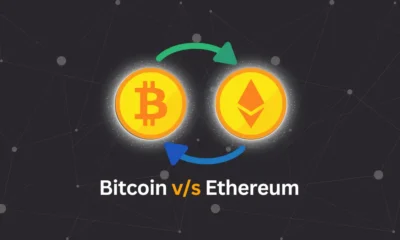Regulations
CRYPTOCURRENCY REGULATION
Cryptocurrency Regulators Navigating Complex Environment

Bitcoin and Ethereum have revolutionized traditional financial management practices.
Their widespread adoption has caused global money management systems to shift significantly, though regulation remains an intricate topic, balancing the promotion of innovation with the protection of consumers against financial crime, something this blog delved deeper into by exploring importance, challenges and possible pathways forwards to crypto regulations.
Importance of Cryptocurrency Regulation
Cryptocurrency Regulation is necessary for several reasons. Chief among them is protecting investors from scams and fraud that are prevalent in an unregulated cryptocurrency space, while at the same time helping ensure financial integrity, protect against money laundering, and stop terrorist financing. A regulator’s role is also crucial in setting clear cryptocurrency rules within wider financial ecosystems. The economic value of development and innovation is unlocked.
Cryptocurrency regulation: Global Perspectives
Not every country’s regulatory approach to cryptocurrency has been equal, some have banned trading altogether while others embrace the technology with open arms China for instance has banned crypto trading due to financial stability and environmental concerns while Malta and Switzerland offer favorable regulatory environments that attract crypto businesses.
US regulation can be complex
Multiple agencies govern cryptocurrency
Commodity Futures Trading Commission has jurisdiction over other commodities. Certain cryptocurrency assets fall within the purview of both agencies, the Securities and Exchange Commission (SEC) and the Commodity Futures Trading Commission. Thus, creating multiple rules that might stymie business innovation while misdirecting those operating within this space. The success of this initiative indicates an expanding awareness of how best to regulate cryptography in an international decentralized currency system as an asset class. With the rising popularity of crypto coins globally, regulatory strategies must address any problems raised due to cryptocurrency’s decentralized structures or global nature if we want an orderly cryptocurrency world.
It can be difficult to regulate cryptocurrencies
The regulatory environment for cryptocurrencies is unique. Due to their borderless, decentralized, and anonymous features, cryptocurrencies are hard to monitor using traditional financial frameworks instead, their rate of development often outpaces regulatory initiatives, forcing regulators into playing catch-up games. Regulation and innovation need to find their appropriate equilibrium, with too much regulation stifling technological development or forcing businesses into less restrictive jurisdictions, yet too little could leave consumers and financial institutions exposed. Cryptocurrency is an evolving industry and must have regulations in place that balance protecting consumers with encouraging innovation. Clare, flexible and inclusive regulatory frameworks require collaboration and inclusion. A flexible approach to cryptocurrency that focuses on activities, rather than technology itself, may be the best way to adapt.
Furthermore, due to its international nature, international cooperation must take place to develop regulatory standards consistent with each border. Regulations play a vital role in helping companies create and test products that are then approved by regulators. Regulation of cryptocurrency, which is constantly evolving, is complicated.
Regulations are a cross-section of law, technology, and finance To keep pace with the steady expansion and maturity of crypto markets, effective regulatory frameworks are imperative in protecting consumers, financial system stability, and innovation while encouraging collaboration between regulators and industry participants something flexible technology-neutral rules can offer as they allow greater collaboration between regulators and crypto industry participants and will support further growth and innovation of cryptocurrency platforms. Adaptations will continue through conversations amongst themselves as well as international cooperation as we tackle opportunities presented by cryptocurrency platforms!
Why You Need to Know
Cryptocurrency is like the wild west of finance exciting, new, but a little scary without any rules. Cryptocurrency regulation has now become relevant. It’s a means of maintaining equity and safety for all parties. It’s very important to understand these regulations as they could affect your cryptocurrency investment. They support the financial system’s stability, guard against fraud, and dissuade dishonest people from utilizing cryptocurrency to commit crimes. Consider it as traffic signals. Even though they may cause frustration, they ensure everyone’s safety while driving! To help you safely manage your crypto challenge, this blog goes even more into the complex world of cryptocurrency rules.

-

 Market Updates1 year ago
Market Updates1 year agoCRYPTOCURRENCY AND DECENTRALIZED FINANCE (DEFI)
-

 Market Updates1 year ago
Market Updates1 year agoHOW CRYPTOCURRENCIES MAY IMPACT THE BANKING INDUSTRY
-

 Crypto Guides1 year ago
Crypto Guides1 year agoBLOCKCHAIN STRUCTURE AND IT’S IMPACT ON CRYPTOCURRENCY PRICES
-

 Investment Tips1 year ago
Investment Tips1 year agoBITCOIN AND ETHEREUM, KNOW WHICH ONE IS BEST
-

 Crypto Guides1 year ago
Crypto Guides1 year agoCRYPTOCURRENCIES AND FINANCIAL TECHNOLOGY
-

 Crypto Guides1 year ago
Crypto Guides1 year agoBEST CRYPTO FREELANCE WRITING
-

 Blockchain Technology1 year ago
Blockchain Technology1 year agoDEVELOPMENT OF BLOCKCHAIN TECHNOLOGY
-

 Blockchain Technology1 year ago
Blockchain Technology1 year agoCAN THE BLOCKCHAIN BE HACKED







